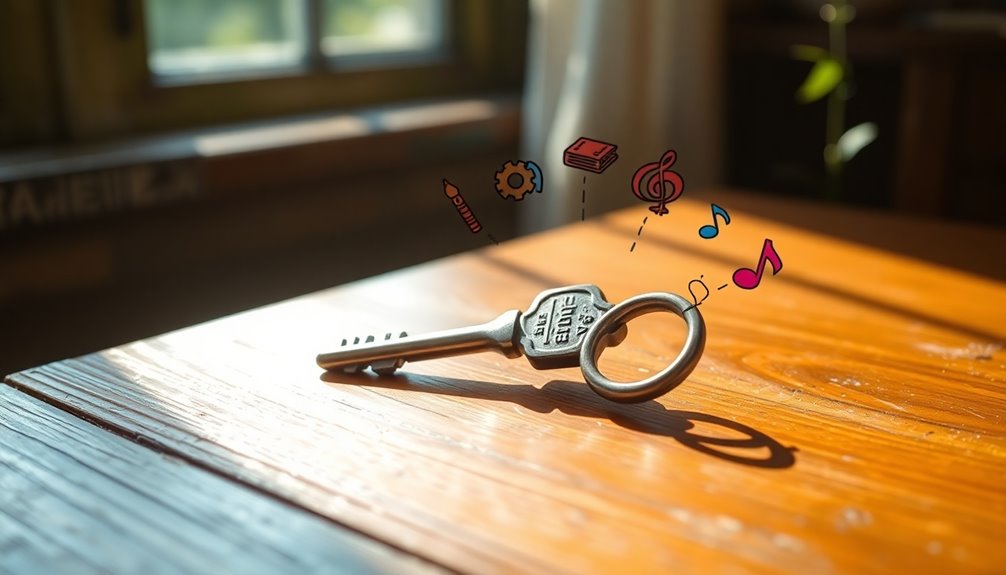When interviewers ask about your unique contributions, they're looking for what sets you apart from the competition. To make an impact, identify your standout skills and experiences that align with the role and company culture. Use concrete examples to illustrate how you've made a difference in past teams or projects. It's crucial to communicate your strengths confidently and keep your response concise. By highlighting your unique perspective, you not only show what you bring to the table but also enhance team dynamics and diversity. There's plenty more to explore on how to maximize this opportunity effectively.
Key Takeaways
- Identify and articulate your unique skills or experiences that align with the role and company culture to stand out in interviews.
- Use concrete examples to demonstrate how your unique contributions have positively impacted previous teams or projects.
- Focus on personal traits that enhance teamwork, such as adaptability or creativity, to showcase your value to potential employers.
- Prepare to communicate your unique contributions confidently, ensuring clarity and conciseness in your responses during interviews.
- Research the company's values and culture to tailor your unique contributions effectively, demonstrating a strong fit for the organization.
Importance of Unique Contributions

When you step into an interview, showcasing your unique contributions can set you apart from the competition. Employers are keen to differentiate candidates, looking for insights that reveal qualities beyond education and experience.
They want to understand how your personality fits within their workplace culture. By highlighting your unique perspectives, you not only demonstrate your potential contributions but also emphasize how you can enhance team dynamics and foster innovation.
This differentiation is vital, as it can lead to better diversity within the organization. Ultimately, your unique contributions could be the deciding factor in whether you land the job, making it essential to communicate these effectively during your interview.
Preparing Your Unique Answer

To craft a compelling unique answer for your interview, start by identifying the specific skills and attributes that set you apart from other candidates.
Focus on what you bring to the table that aligns with the role and company culture. Consider these aspects:
- Your rare technical skills or certifications.
- Unique experiences that relate to the job.
- Personal traits that enhance teamwork and collaboration.
- Specific accomplishments that showcase your impact.
- Insights into challenges you can help solve for the employer.
Additionally, leveraging your involvement in online communities can demonstrate your commitment to continuous learning and networking.
Once you've pinpointed these elements, practice articulating them clearly and confidently.
Tailor your answer to reflect the employer's needs, ensuring you present a narrative that resonates with their expectations and highlights your unique contributions.
Effective Communication Techniques

Articulating your unique contributions effectively can make a significant difference in how interviewers perceive you. Start by confidently presenting your strengths, focusing on specific, quantifiable achievements.
Instead of general statements, use concrete examples that showcase your impact. When discussing your skills, relate them directly to the job and the company's needs, ensuring your answers resonate with the interviewer.
Maintain a positive tone and avoid negative comments about past employers. Keep your responses concise to respect the interviewer's time while inviting further discussion.
Finally, practice active listening; it helps you tailor your answers dynamically during the conversation, making your communication more engaging and relevant. Effective communication not only highlights your unique contributions but also demonstrates your interpersonal skills. Additionally, incorporating techniques for sustaining motivation can enhance your confidence and presentation during the interview process.
Strategies for Interview Success

While preparing for an interview can feel overwhelming, implementing effective strategies can greatly boost your chances of success. Start by conducting thorough research on the company's culture and values. This'll help you tailor your responses to align with what they're looking for. Additionally, practice common interview questions to gain confidence.
Consider these strategies:
- Dress appropriately to fit the company's standards.
- Prepare insightful questions for the interviewer about the role.
- Follow up with a thank-you email to express gratitude and reinforce your interest.
- Take notes during the interview for future reference.
- Create a structured approach to keep your responses clear and focused.
- Implement active listening techniques during the interview to demonstrate your engagement and understanding of the role.
Examples of Unique Contributions

Understanding the types of unique contributions you can highlight in an interview can set you apart from other candidates. For instance, if you've led a team project that increased efficiency by 30%, that's a strong contribution to mention.
Similarly, if you possess a rare skill, like proficiency in a specific software essential for the role, emphasize that. You might also share experiences where your innovative ideas led to cost savings or improved processes.
If you've successfully navigated complex client relationships that resulted in long-term partnerships, that's significant too. Ultimately, align your contributions with the company's goals, showcasing how you can add value and enhance their team dynamics. Additionally, consider discussing your understanding of retirement savings plans, as this demonstrates your ability to think strategically about long-term financial health.
Highlighting these examples can make a lasting impression on your interviewer.
Common Interview Questions

What common interview questions can you expect to encounter? These questions are designed to uncover your motivations, experiences, and unique contributions. Being prepared can give you an edge.
Here are some typical questions you might face:
- "Why do you want to be a student ambassador?"
- "Who are you?"
- "Tell me about a time you failed."
- "What do you bring to the table?"
- "How do you interview for a job with no experience?"
Each question aims to assess different aspects of your personality, skills, and adaptability. Additionally, understanding state-specific benefits can help you articulate how your unique experiences align with the position you're applying for.
Reflecting on Your Strengths

Reflecting on your strengths is essential for making a lasting impression in interviews. By identifying what sets you apart, you can effectively showcase your unique contributions.
Think about specific skills or experiences that align with the job requirements. For instance, if you're detail-oriented, mention how that quality helped you achieve a project goal. Use quantifiable achievements to back up your claims, like increasing efficiency by a certain percentage.
Tailor your strengths to the company's needs and culture, highlighting how you can fill potential gaps they face. Remember, presenting your strengths confidently can demonstrate not only your capabilities but also your suitability for the role. Additionally, showcasing strong communication skills can significantly enhance your ability to connect with interviewers.
Ultimately, this reflection helps you connect more deeply with interviewers and leaves a memorable mark.
Frequently Asked Questions
How Can I Identify My Unique Contributions?
To identify your unique contributions, start by reflecting on your experiences and strengths.
Think about specific tasks where you've excelled or projects that highlight your skills.
Consider feedback from colleagues and past achievements that set you apart.
Align these insights with the job description and the company's values.
Finally, practice articulating your contributions clearly, ensuring they demonstrate how you can add value to the team and enhance the organization's goals.
What if My Experiences Don't Feel Unique?
You might feel like you're just another needle in the haystack, but everyone's got a unique story to tell, just like each snowflake is different.
Think about the challenges you've faced and the lessons you've learned. Your experiences, even if common, shape your perspective.
Reflect on how you approached tasks differently or the creative solutions you've offered. Focus on those moments; they're what make you stand out.
Embrace your narrative!
How Do I Showcase Soft Skills as Unique Contributions?
Showcasing your soft skills as unique contributions starts with identifying what sets you apart.
Think about how your communication, teamwork, or problem-solving abilities have positively impacted past projects.
When discussing these skills, use specific examples to illustrate their effectiveness.
For instance, share a story where your empathy led to a successful resolution.
Can Unique Contributions Be Learned or Developed Over Time?
Think of unique contributions as seeds in a garden; with the right care, they can flourish over time.
You can learn and develop these traits through experiences, feedback, and practice. Embracing new challenges and stepping out of your comfort zone nurtures your growth.
As you gain insights and skills, your unique contributions evolve, enriching not only your professional life but also the teams and organizations you become a part of.
How Do Cultural Differences Affect Unique Contributions in Interviews?
Cultural differences can greatly affect unique contributions in interviews. You might express ideas and experiences shaped by your background, which can resonate differently with interviewers.
Understanding these variations helps you articulate your strengths effectively. For instance, you might value teamwork over individual achievement, while others might prioritize self-promotion.
Acknowledging and adapting to these cultural nuances can enhance your communication, making your contributions more relatable and impactful within diverse workplace settings.
Conclusion
To sum up, showcasing your unique contributions in an interview isn't just about listing skills—it's about painting a vivid picture of how you can enhance the team. Think of your experiences as colorful threads in a tapestry; when woven together, they create a rich and compelling narrative. By effectively communicating your strengths and aligning them with the company's values, you'll not only stand out but also demonstrate your potential impact. Embrace this opportunity to shine and make a lasting impression!









